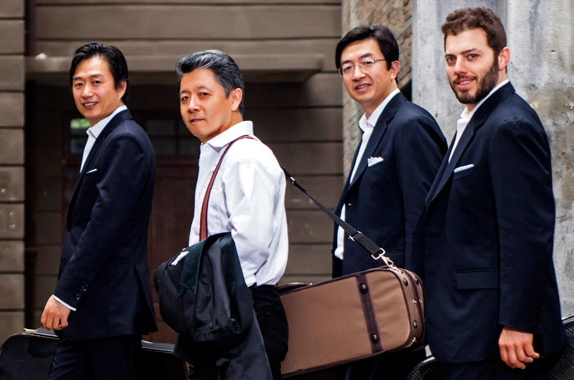Shanghai Quartet closes UC Presents season with wide-ranging program
Celebrating its 30th anniversary season, the Shanghai Quartet appeared on the University of Chicago Presents Series for the first time Friday night at Mandel Hall, closing out the series’ 70th anniversary season in grand style.
Founding violinist brothers Weigand Li and Hongang Li are still part of the group, although Hongang switched to viola when violinist Yi-Wen Jiang joined the group in 1994. American cellist Nicholas Tzavaras joined in 2000.
The Shanghai Quartet was formed in 1983 by classmates in the early years of the People’s Republic of China opening up to the West. The group competed in England’s Portsmouth International Quartet Competition where it placed second, and one of its hallmarks has long been a coming together of the cultures of East and West.
In that spirit, the Shanghai presented Zhou Long’s Song of the Ch’in, a piece that attempts to approximate the timbres and textures of the title traditional Chinese ch’in–a seven-stringed plucked zither-like instrument long associated with sages and scholars.
The piece called for the performers, especially Tzavaras, to swoop in and out of fixed pitches as a ch’in player would do, an aesthetic similar to glissandi in the West. To have Western string instruments achieve the harder sound associated with the ch’in, all players were skillfully playing on the edge of their bridges, a curious metaphor for a piece that attempts to bridge cultures.
The highlight of the evening was the Penderecki String Quartet No. 3, Leaves from an unwritten diary, a work commissioned for the Shanghai group’s 25th anniversary.
Some forty years had passed between the composition of Penderecki’s Quartet No. 3 and No. 4, to say nothing of a shift in style which had taken Penderecki away from his early trademark revolutionary avant garde sound. What is attractive about the Third Quartet is that while tonal, it is nonetheless ferociously chromatic and allows a wide range across all of the instruments, making for a vast canvas as quartets go.
This being “their” piece and a work that the Shanghai is obviously deeply committed to, they performed it with great relish and gusto, with carefully coordinated effects that were astonishing in their impact and with constant tension palpable.
By contrast, the Haydn Quartet in D minor, Op. 76, No. 2, a work every bit as daring in its day that opened the evening, seemed rather staid by comparison. The Shanghai prefer a Romanticized approach to Haydn, which often made this come off a bit like Beethoven Lite. Despite good balances among the players, the playing tended to be loud, bright and slow.
The program concluded with the Verdi String Quartet, a late-season entry in 2013’s Verdi bicentennial. It was surprising that this piece was not part of the area’s fall festivities related to the celebration, but better late than never.
Verdi’s only chamber work was written while the composer was in Naples waiting for an ailing soprano to recover enough to sing the Italian premiere of Aida.The work is quite melodic, and indeed, it would have been great had the Shanghai performance put greater emphasis on the singing aspects of the piece. Nonetheless, its many effects–especially the balance needed between structure and humor of the fugal finale–were well-rendered, and it crowned an eclectic evening in largely satisfying fashion.
Posted in Performances



